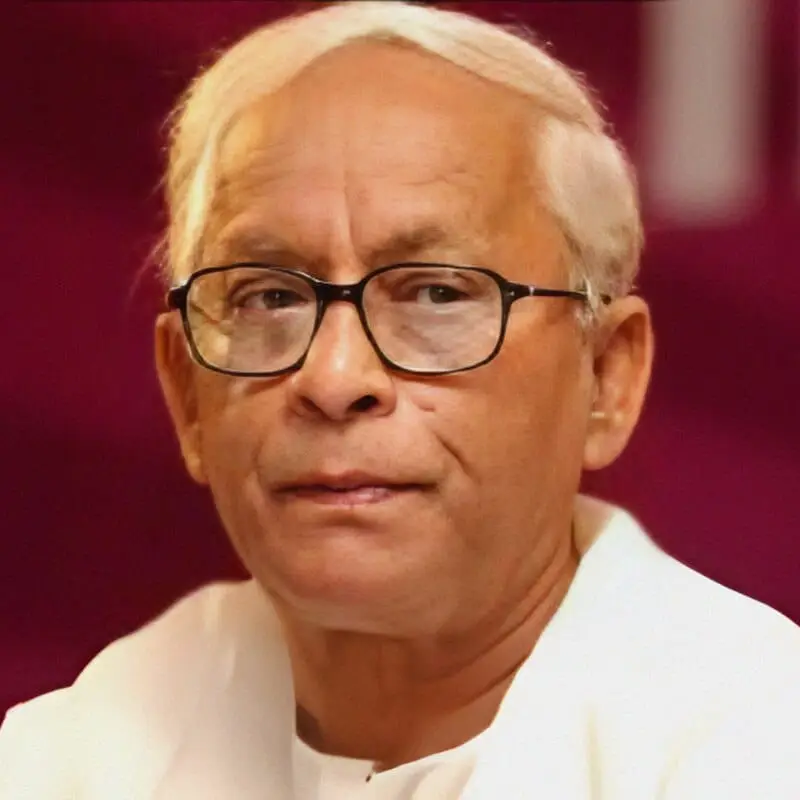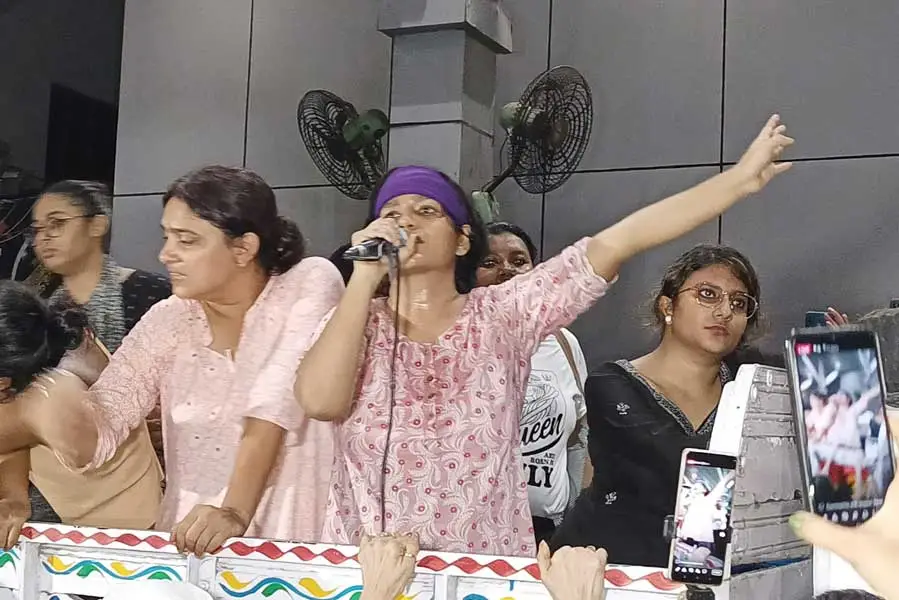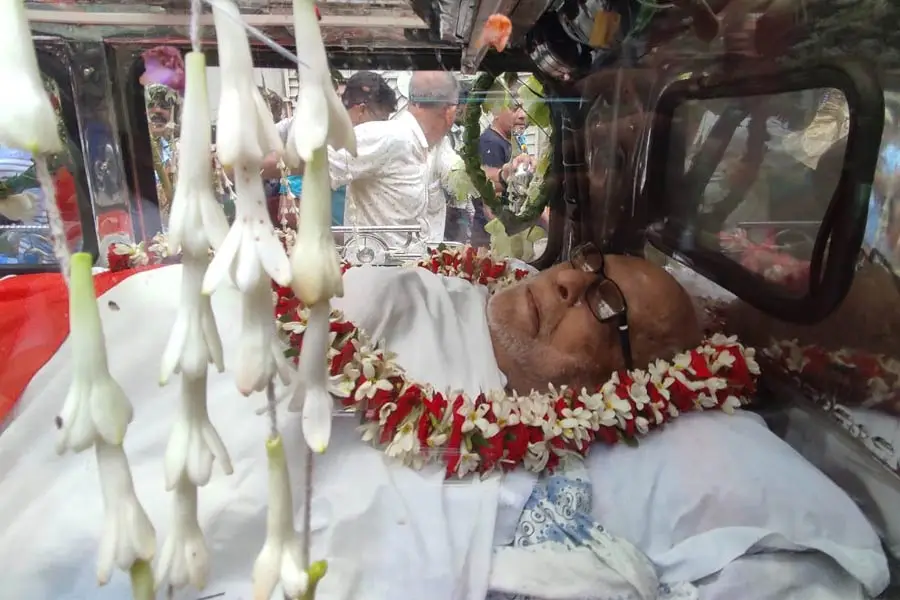
(11:26: Former MLAs also paid their respects)
(11:35: Calcutta CP, State Police DG paid tribute)
(11:47: The hearse stopped at the gate of the Vidhan Sabha)
(12:05: Buddhadev’s body reached Alimuddin Street)
(12:38: ‘Comrade Ravida’ came to see Buddhadev for the last time)
(12:52: Long line outside Alimuddin)
(13:24: People from the cultural world also paid their respects)
(13:15: Minister Babul paid his last respects to Alimuddin)
(13:06: Congress leaders paid their last respects)
Final Journey of Buddhadev Bhattacharya: A State’s Farewell
On Friday, the late former Chief Minister Buddhadev Bhattacharya embarked on his final journey, marking the end of an era in West Bengal’s political landscape. Since Thursday, his body lay in repose at Peace World, where countless mourners paid their respects to Buddhadev Bhattacharya. The removal of the body was scheduled for Friday at 10:30 am, signaling the beginning of a somber day for many. The final journey of Buddhadev Bhattacharya commenced shortly thereafter, as the body was transported to the state assembly, and then to the CPM state office on Alimuddin Street, where it would remain until 3 p.m., offering one last chance for the people to bid farewell to a leader who had shaped the state’s history.
The Industrial-Agricultural Debate: Buddhadev Bhattacharya’s Legacy and Controversies
One of the defining aspects of Buddhadev Bhattacharya’s tenure as Chief Minister was his approach to industrialization and agriculture, which often sparked heated debates within and outside his party. During his final journey, the echoes of this debate were still present, reflecting the deep impact of his policies on the state’s socio-economic landscape.
A left-leaning activist, who had come to Alimuddin to pay her final respects to Buddhadev Bhattacharya, poignantly remarked, “We lost everything today.” She lamented the fact that Buddhadev Bhattacharya’s dream of bringing industry to the state had not fully materialized. “If his dream had come true, the state would have been different,” she added, highlighting the ongoing struggle between industrialization and agricultural preservation that defined his time in office.
Buddhadev Bhattacharya’s tenure was marked by the infamous Singur and Nandigram incidents, where the push for industrial projects led to violent clashes and political upheaval. The slogan “Agriculture is our foundation, Industry is our future” became synonymous with Buddhadev Bhattacharya’s administration, encapsulating his belief in the complementary roles of both sectors in the state’s development. However, this vision also fueled controversy and division, both within the Left Front and among the general populace.
The Cultural Community’s Tribute: Buddhadev Bhattacharya’s Influence on Art and Politics
Members of the cultural community, who often found an ally in Buddhadev Bhattacharya’s policies and vision, also gathered to pay their respects. Figures like actor Shankar Chakraborty and playwright Chandan Sen were among those who came to bid farewell to a leader who understood the importance of art and culture in shaping societal values.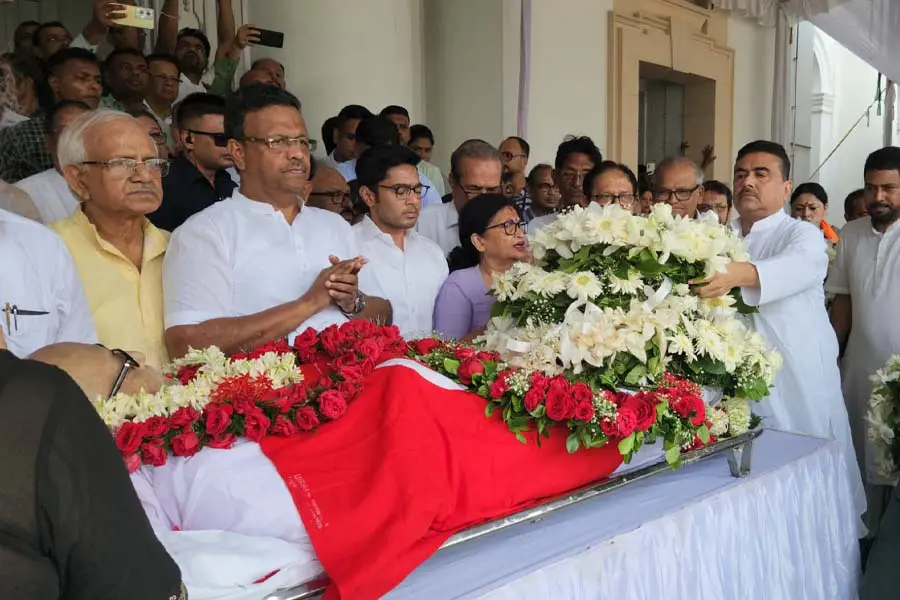
Buddhadev Bhattacharya’s support for the cultural sector was well-known, and during his tenure, the state saw a flourishing of artistic endeavors. Theatres, films, and literature found a supportive environment under Buddhadev Bhattacharya’s leadership, and many artists credited him with understanding the deep connection between culture and politics. His belief that “Art is our future” resonated with many, as it underscored his commitment to fostering a culturally rich society, even amidst economic and political challenges.
Minister Babul’s Final Homage: Respect for Buddhadev Bhattacharya Beyond Political Ideologies
State Minister Babul Supriyo, known for his contrasting political views, also paid his final respects to Buddhadev Bhattacharya at Alimuddin Road. His presence was a reminder that Buddhadev Bhattacharya’s influence extended beyond mere political affiliations. “It’s not a matter of political ideology,” Babul commented later. “We had several private conversations. We have lost a good man.”
This statement highlights a lesser-known aspect of Buddhadev Bhattacharya’s persona—his ability to engage in meaningful dialogue across political divides. Despite the fierce political battles that characterized his career, Buddhadev Bhattacharya was respected by many for his integrity and commitment to the people of West Bengal. His death brought together leaders from across the political spectrum, all united in their respect for a man who had dedicated his life to public service.
Congress Leaders Pay Their Respects: A Tribute Across Party Lines to Buddhadev Bhattacharya
The body of Buddhadev Bhattacharya was placed at Muzaffar Ahmed Bhavan on Alimuddin Street, where senior Congressman Pradeep Bhattacharya, along with other state Congress leaders like Shubhankar Sarkar and Nepal Mahato, visited to pay their respects. This gesture of respect from Congress leaders is significant, given the historical rivalry between the Congress party and the Left Front in West Bengal.
Pradeep Bhattacharya’s remarks after paying his respects were poignant: “Bengali people are sad today. We have lost both an honest man and an honest politician.” His words echoed the sentiments of many who saw in Buddhadev Bhattacharya a leader whose honesty and dedication transcended party politics. The presence of Congress leaders at the CPM office was a powerful symbol of the respect Buddhadev Bhattacharya commanded across the political divide, further cementing his legacy as a statesman who worked for the greater good of the state.
Long Line Outside Alimuddin: The People’s Farewell to Buddhadev Bhattacharya
As the body of Buddhadev Bhattacharya lay in state at the CPM office on Alimuddin Street, a long line of common people formed outside, all eager to pay their final respects. The scene was a testament to the deep connection Buddhadev Bhattacharya had with the people of West Bengal. Many wore black badges featuring a black-and-white image of Buddhadev Bhattacharya, with inscriptions such as “Buddhadev Bhattacharya Lal Lal Lal Salam” and “Comrade Buddhadev Bhattacharya Amar Rahe.”
The crowd outside Alimuddin was a diverse mix of people—young and old, men and women, from different walks of life. They had come to say goodbye to a leader who had been a part of their lives for decades. For many, Buddhadev Bhattacharya was not just a political figure but a symbol of their hopes and aspirations. His passing marked the end of an era, and the outpouring of grief and respect was a reflection of the deep impact he had on their lives.
‘Comrade Ravida’ Pays Final Visit: A Symbol of Loyalty and Respect to Buddhadev Bhattacharya
Among those who came to pay their respects was “Comrade Ravi,” affectionately known as “Ravida” by CPM workers and supporters. Despite his frailty and inability to walk normally, Ravi made the journey in a wheelchair to Alimuddin, determined to pay his final respects to Buddhadev Bhattacharya. His presence was a poignant reminder of the deep bonds of loyalty and respect that Buddhadev Bhattacharya had forged with his comrades over the years.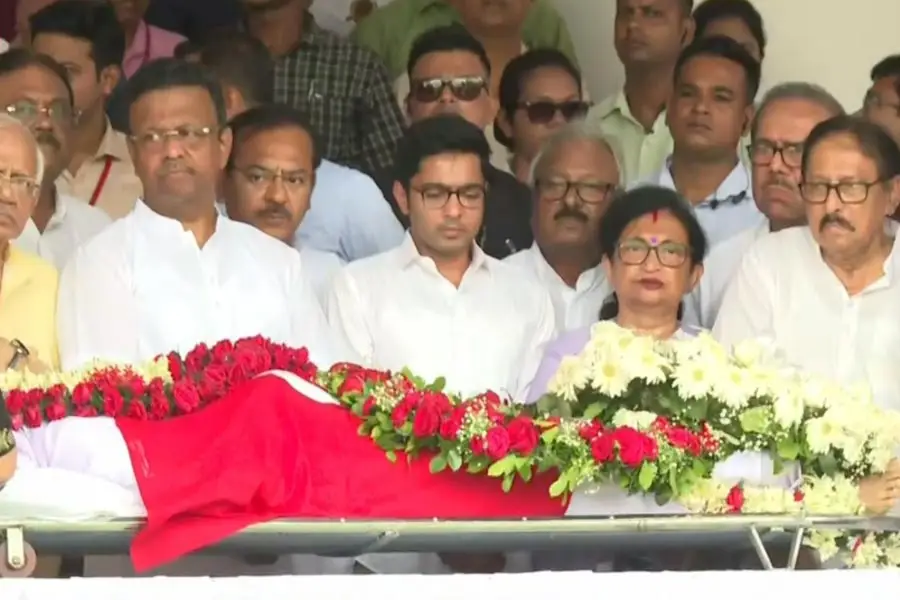
Even when Buddhadev Bhattacharya was in the hospital, receiving treatment for his ailments, Ravi had visited him, showing his unwavering support and admiration. On Friday, as he said his final goodbye, Ravi’s words were filled with emotion: “Whoever I lost, he is more precious than gold.” His sentiments were shared by many who had worked alongside Buddhadev Bhattacharya in the CPM, and his presence at the final journey was a symbol of the deep camaraderie that had characterized their relationship.
Gathering at Alimuddin: Leaders and Activists Unite in Mourning for Buddhadev Bhattacharya
The CPM state office on Alimuddin Street became a gathering point for leaders and activists from across the leftist spectrum, all united in their mourning for Buddhadev Bhattacharya. The office, which had witnessed countless political battles and discussions over the years, was now the site of a solemn tribute to one of its most prominent leaders.
Among those present were former CPM General Secretary Prakash Karat, CPI State Secretary D Raja, CPM State Secretary Mohammad Salim, former Tripura Chief Minister Manik Sarkar, former Party State Secretary and former Leader of Opposition Suryakant Mishra, and Left Minister of Fisheries Kiranmoy Nanda, leader of the Samajwadi Party. Their presence was a testament to the respect and admiration Buddhadev Bhattacharya commanded within the leftist political community.
The Final Journey: A Somber Procession Through the Streets of Kolkata in Honor of Buddhadev Bhattacharya
As the hearse carrying Buddhadev Bhattacharya’s body made its way through the streets of Kolkata, it was accompanied by a somber procession of mourners. The vehicle, draped in red flags and adorned with garlands of red roses and Rajnigandha, was a fitting tribute to a leader who had dedicated his life to the cause of the leftist movement.
The hearse stopped briefly at the Assembly gate, where a large crowd had gathered to pay their last respects. The slogan “Buddhadev Bhattacharya Lal Salam” echoed through the air as former workers of the Assembly, along with other mourners, paid tribute to the man who had once led the state with a firm yet compassionate hand.

